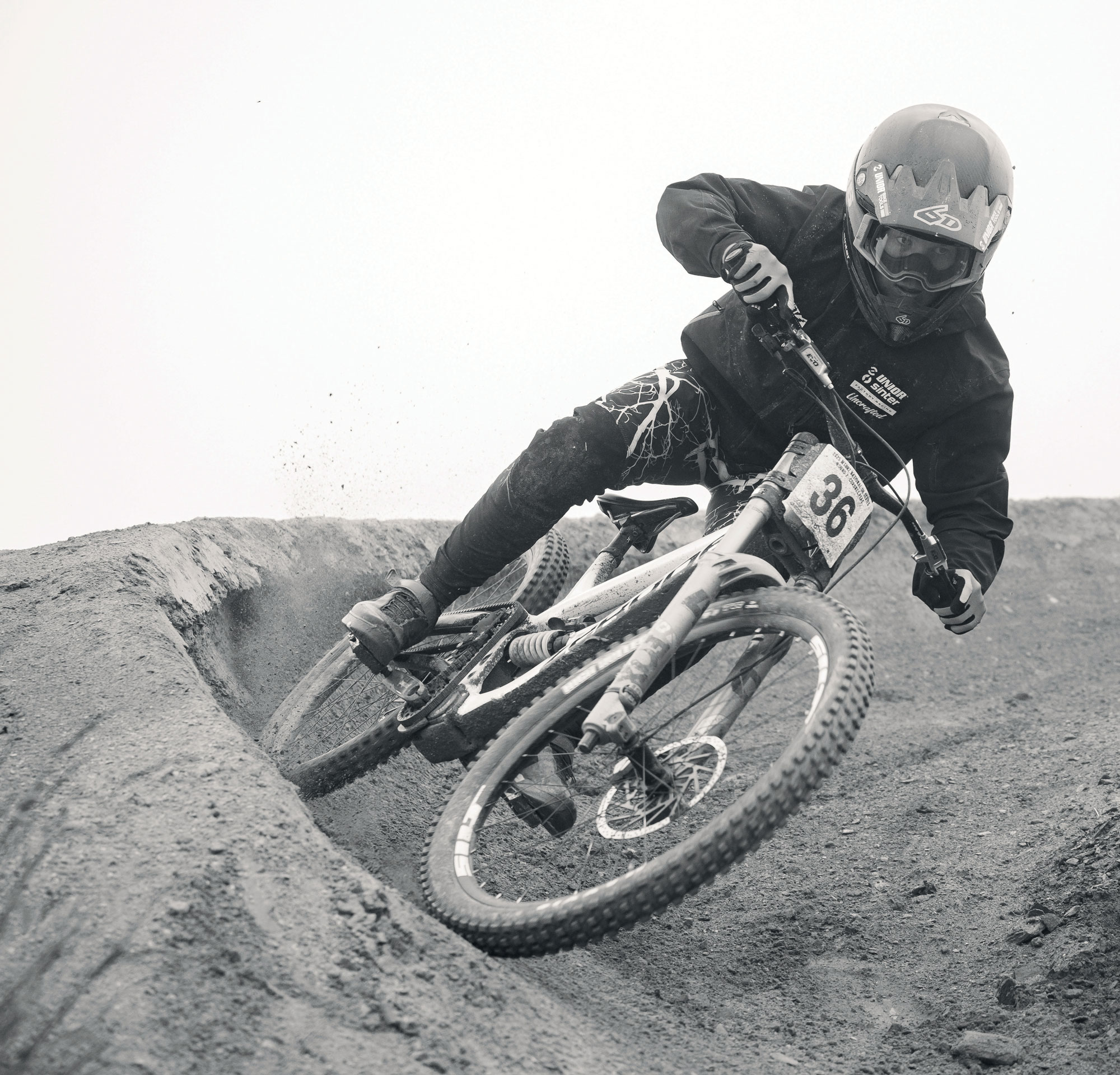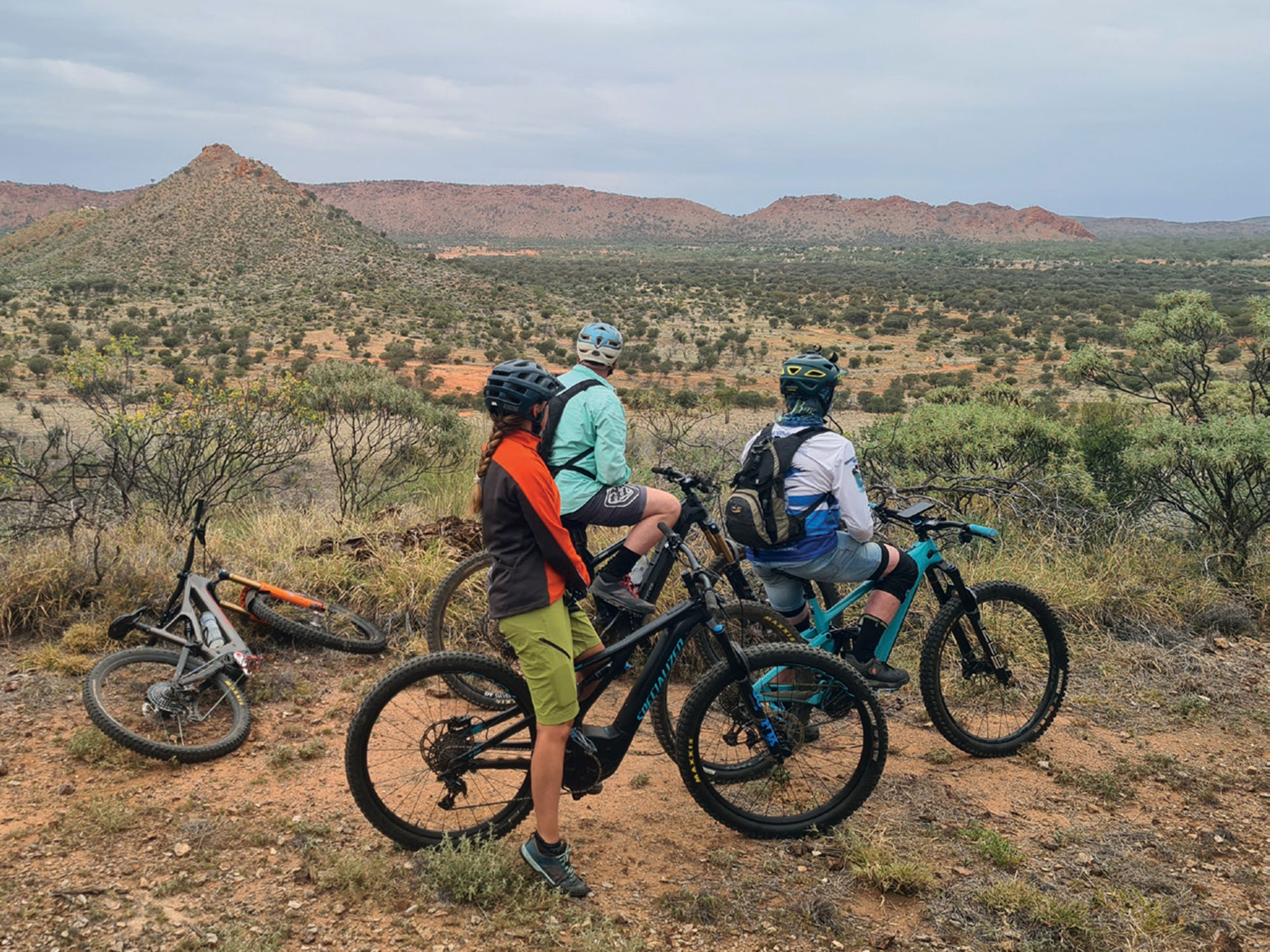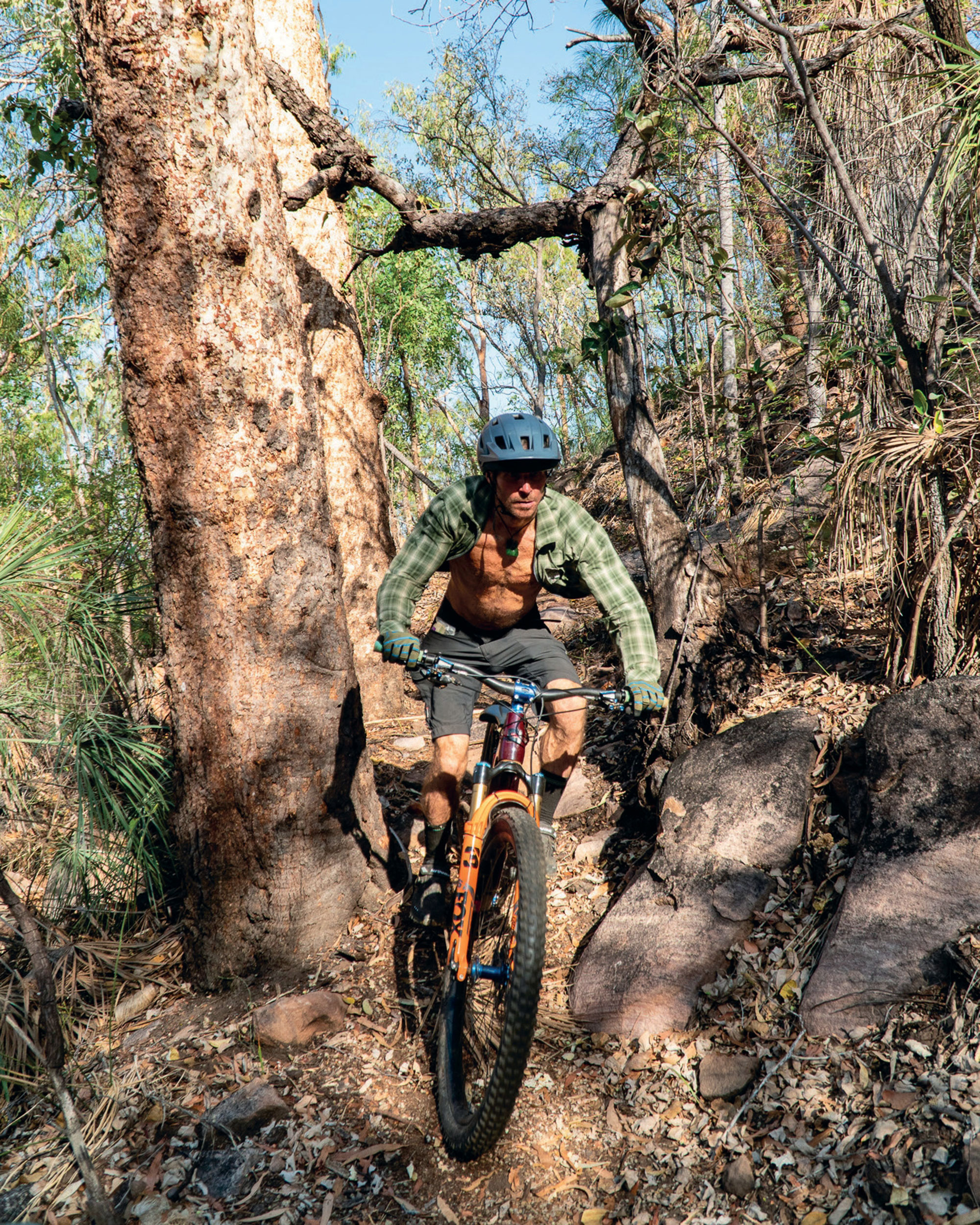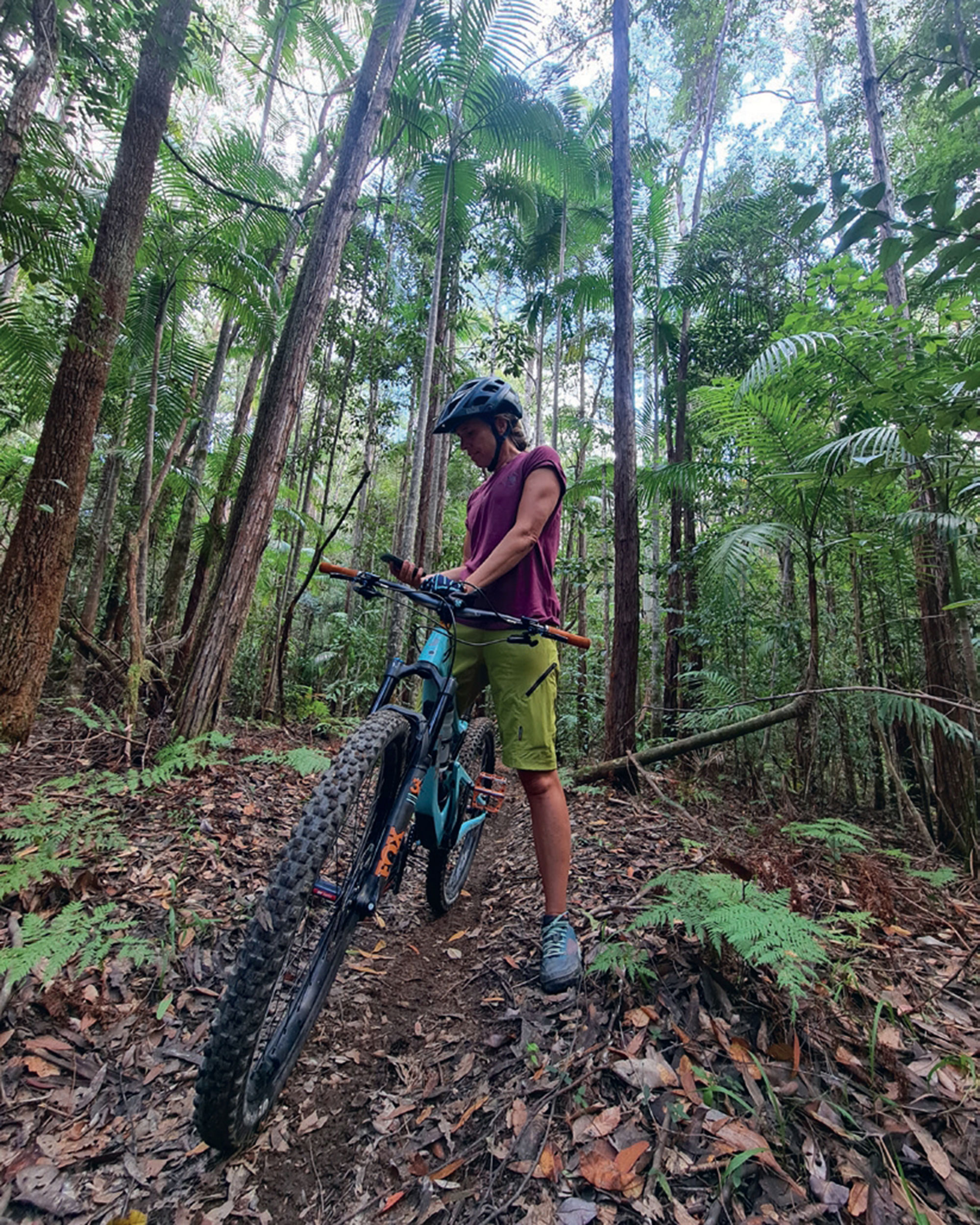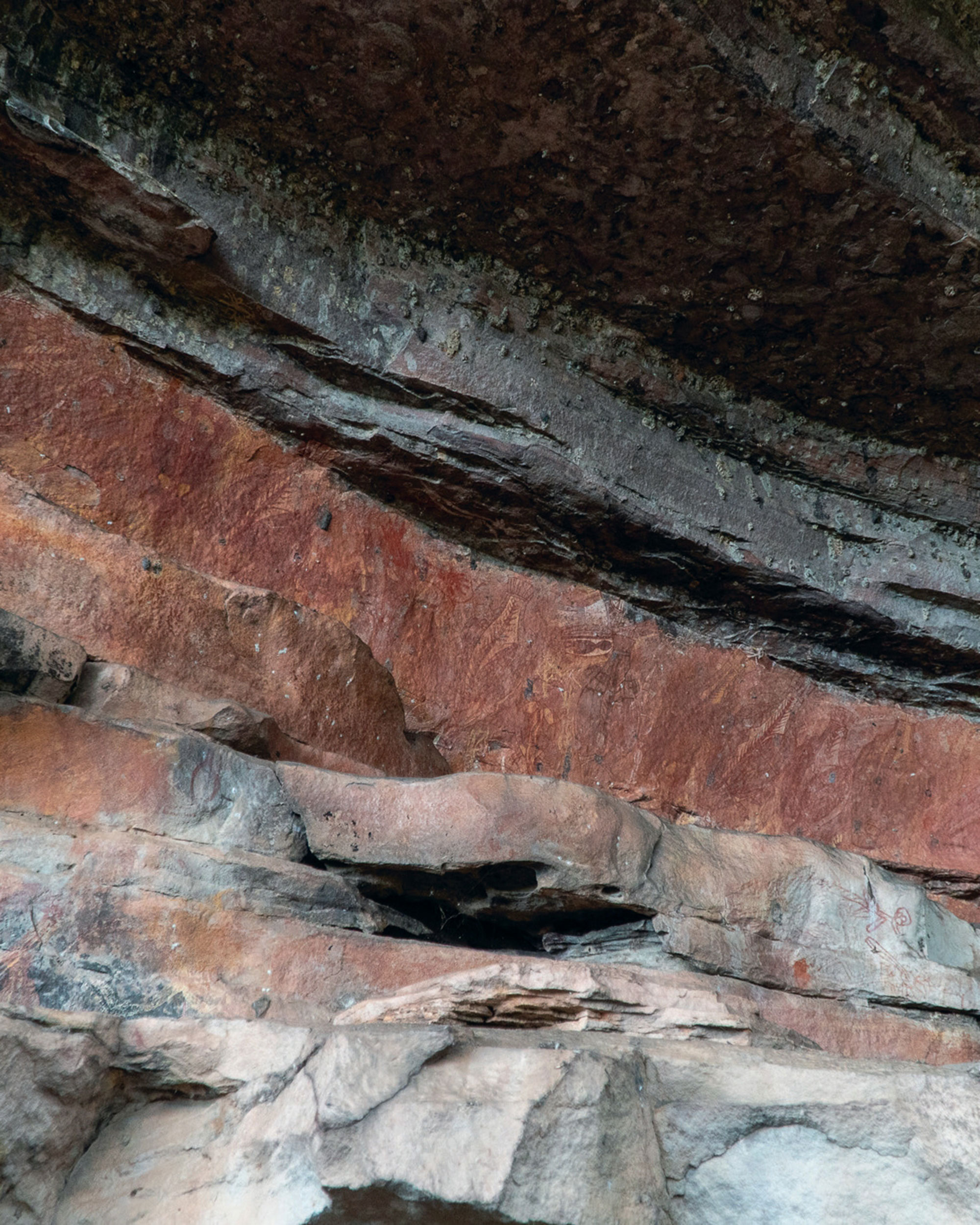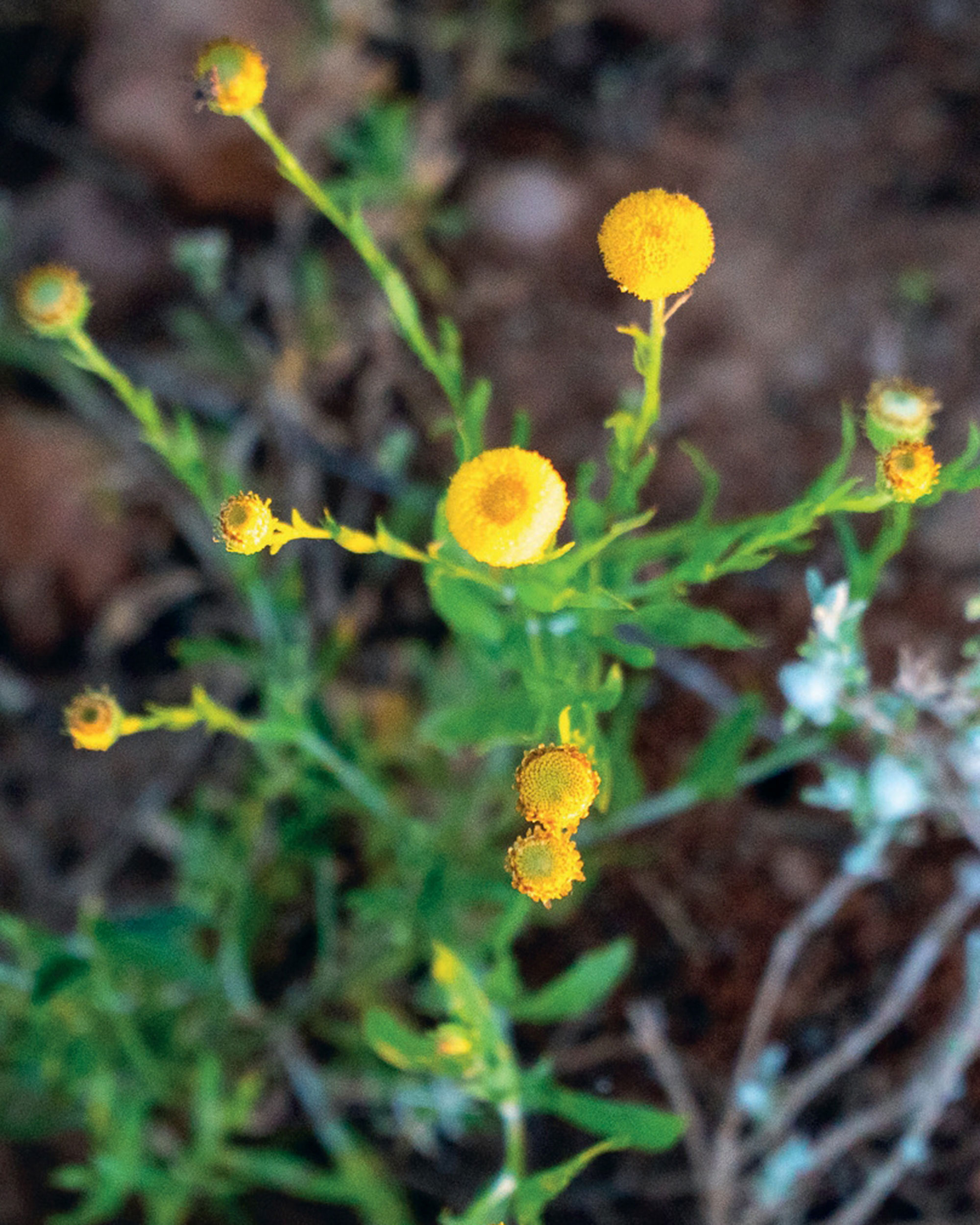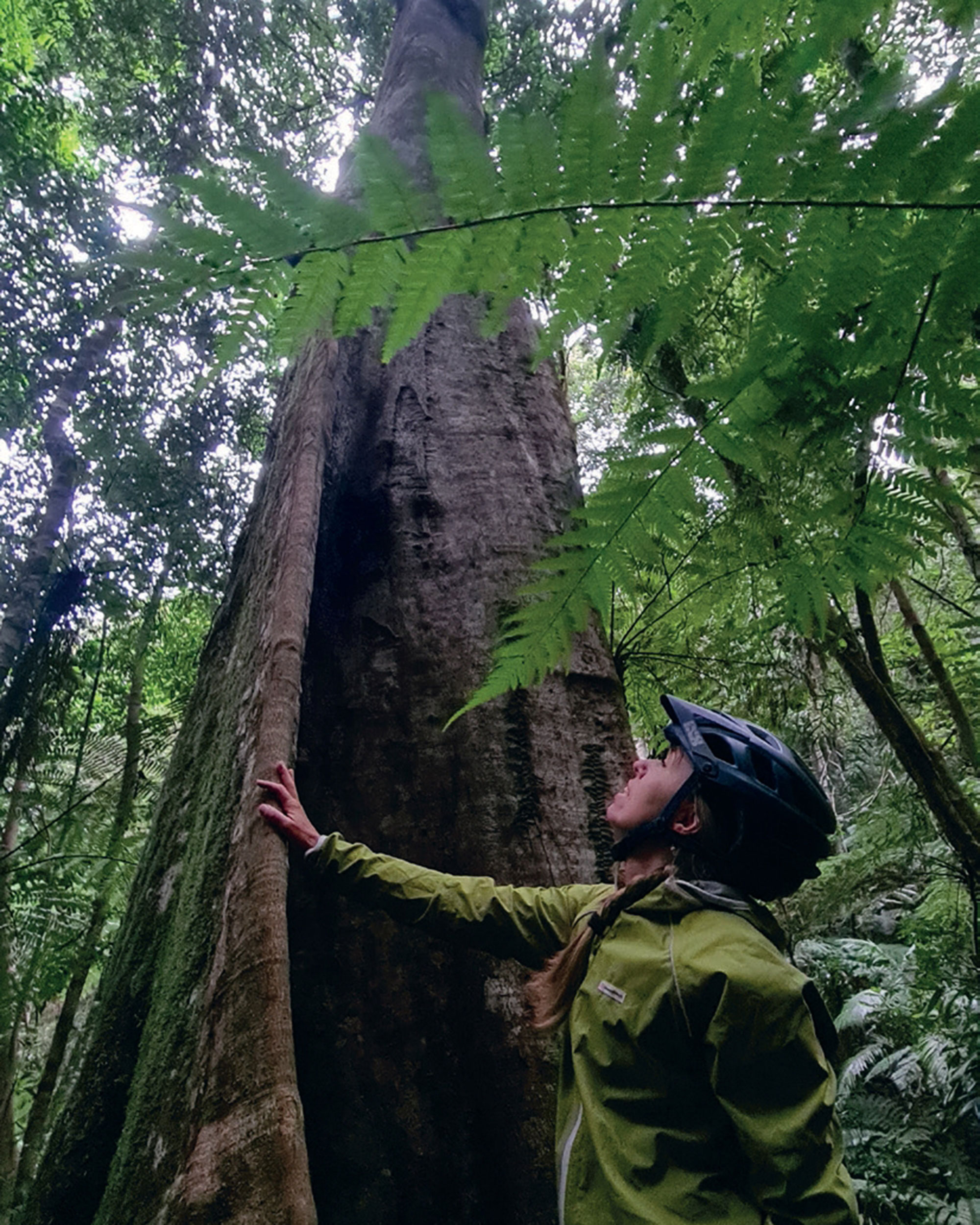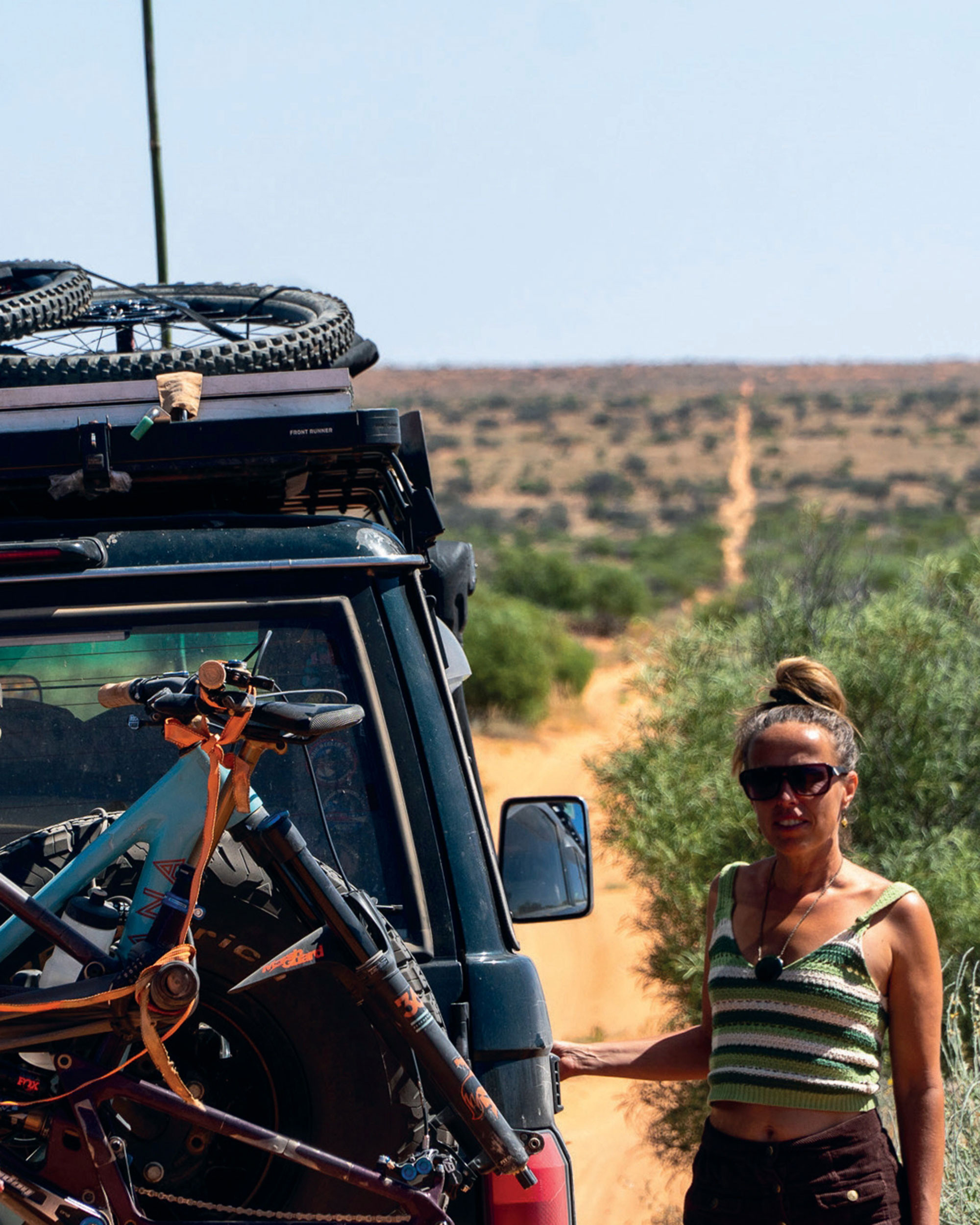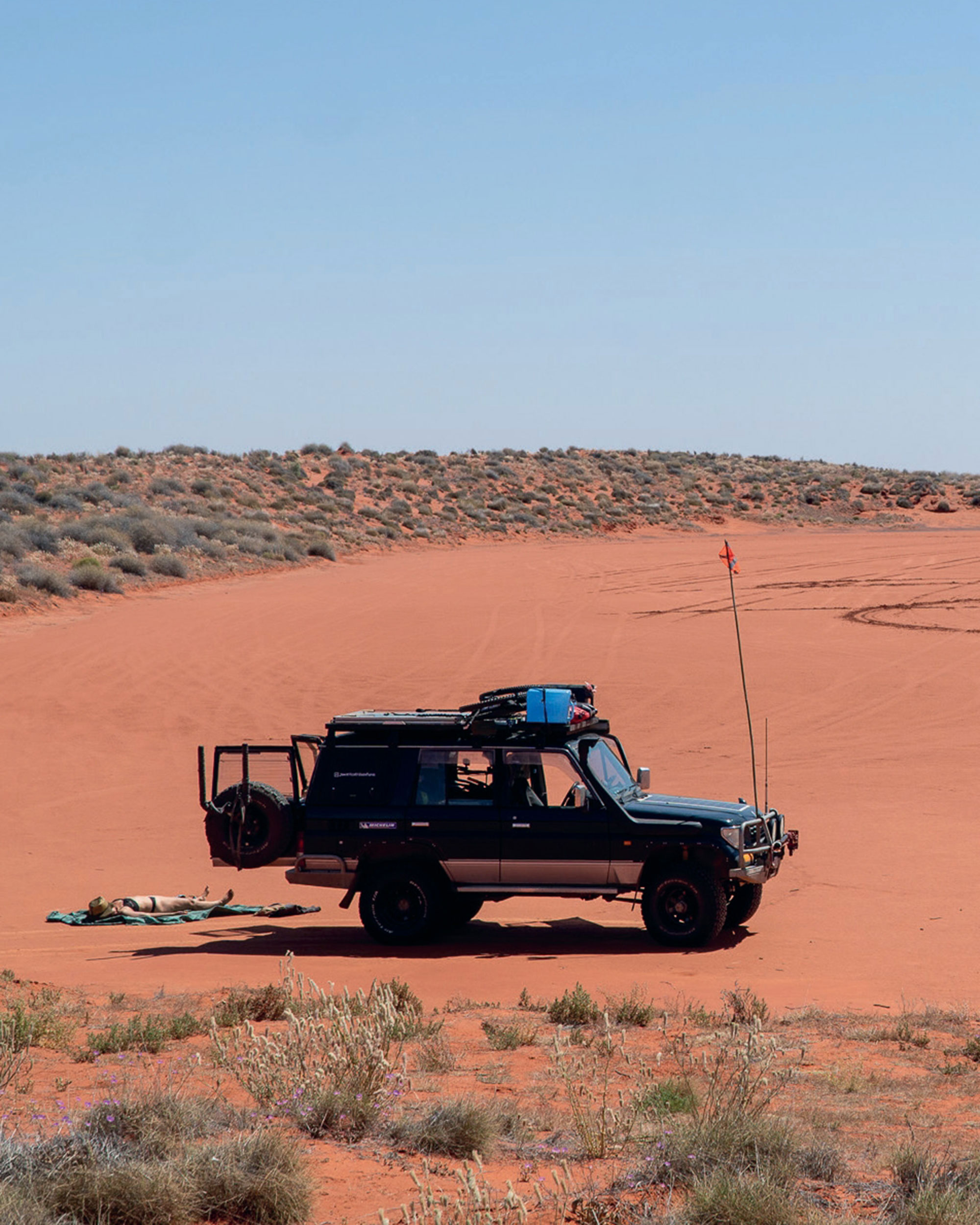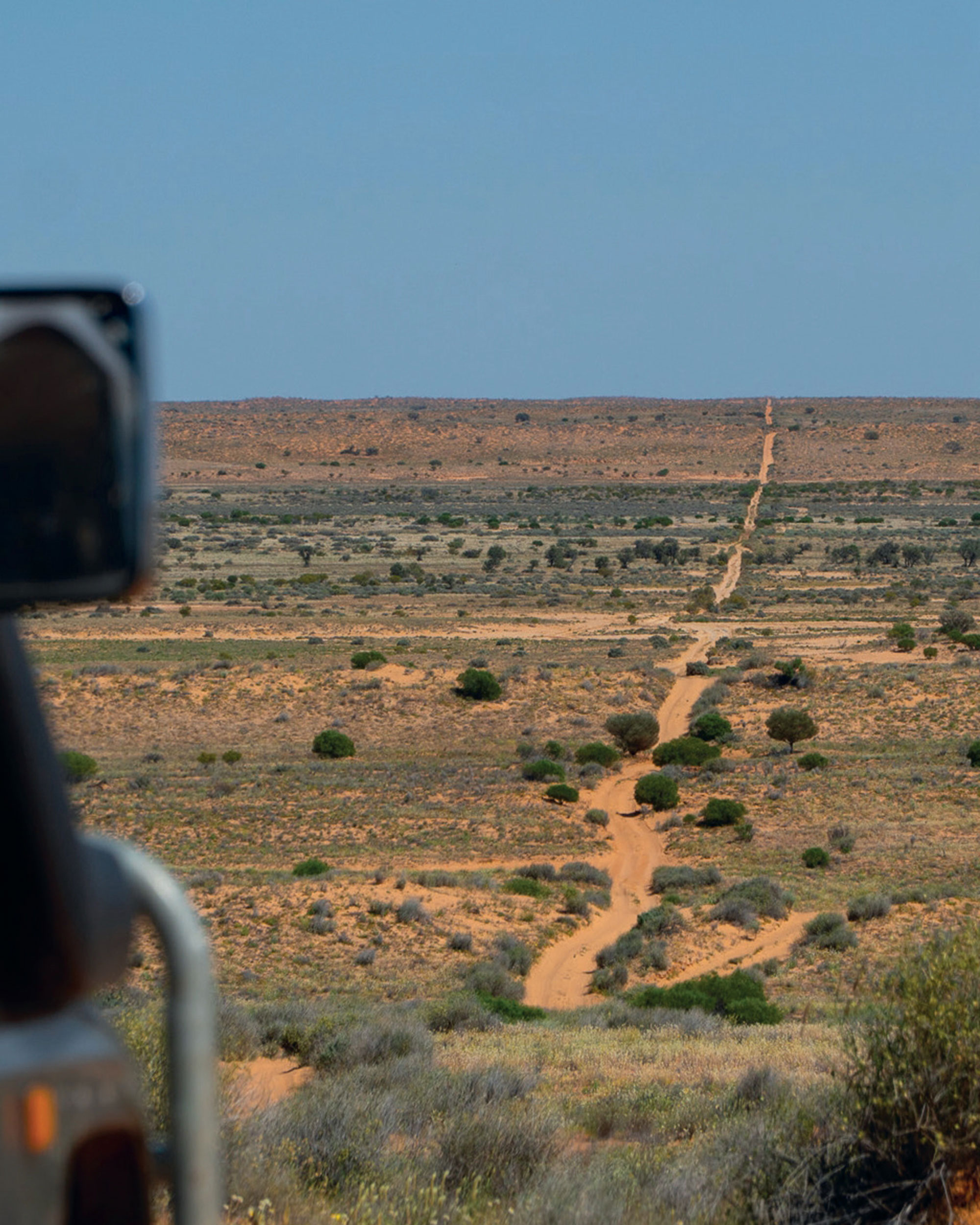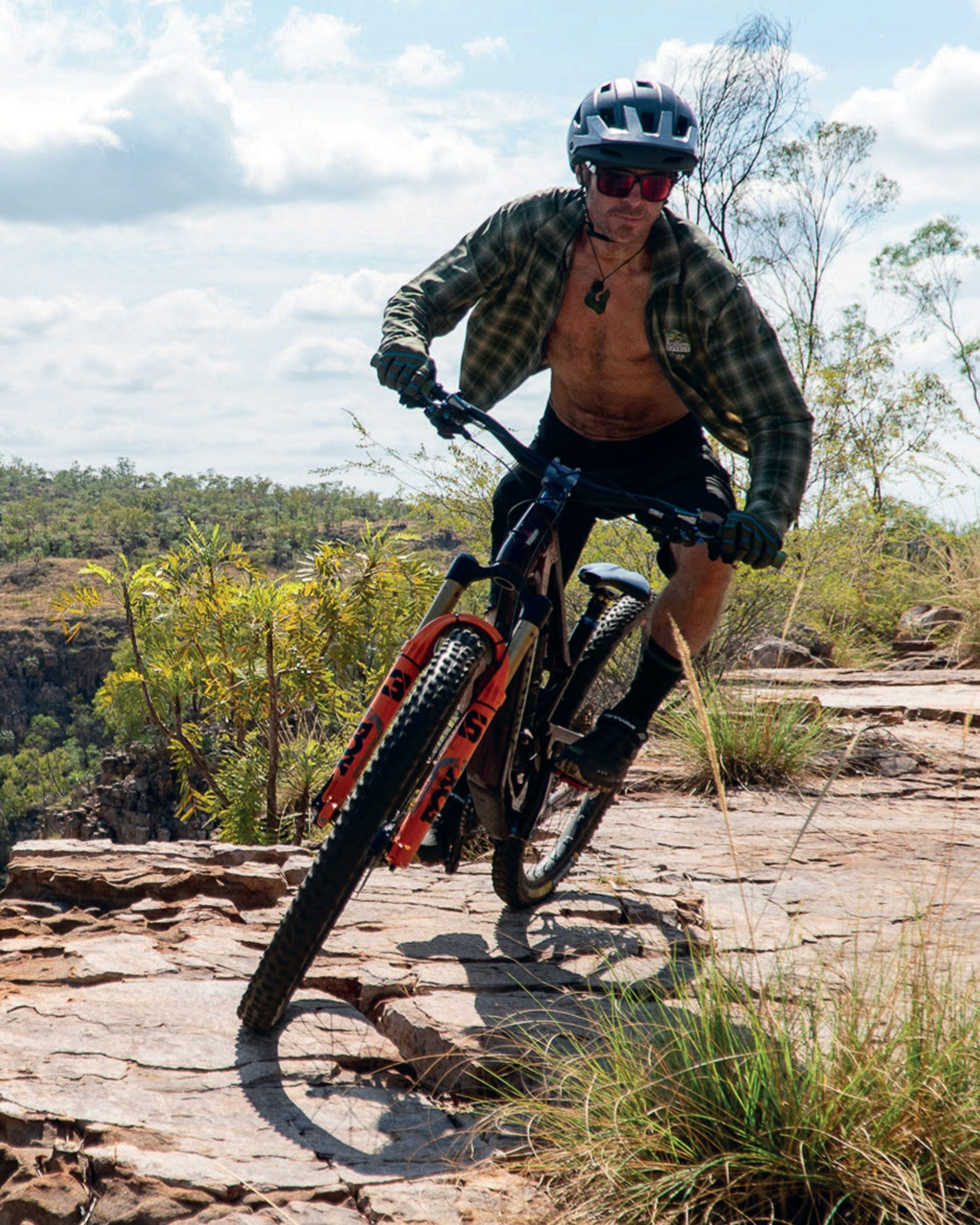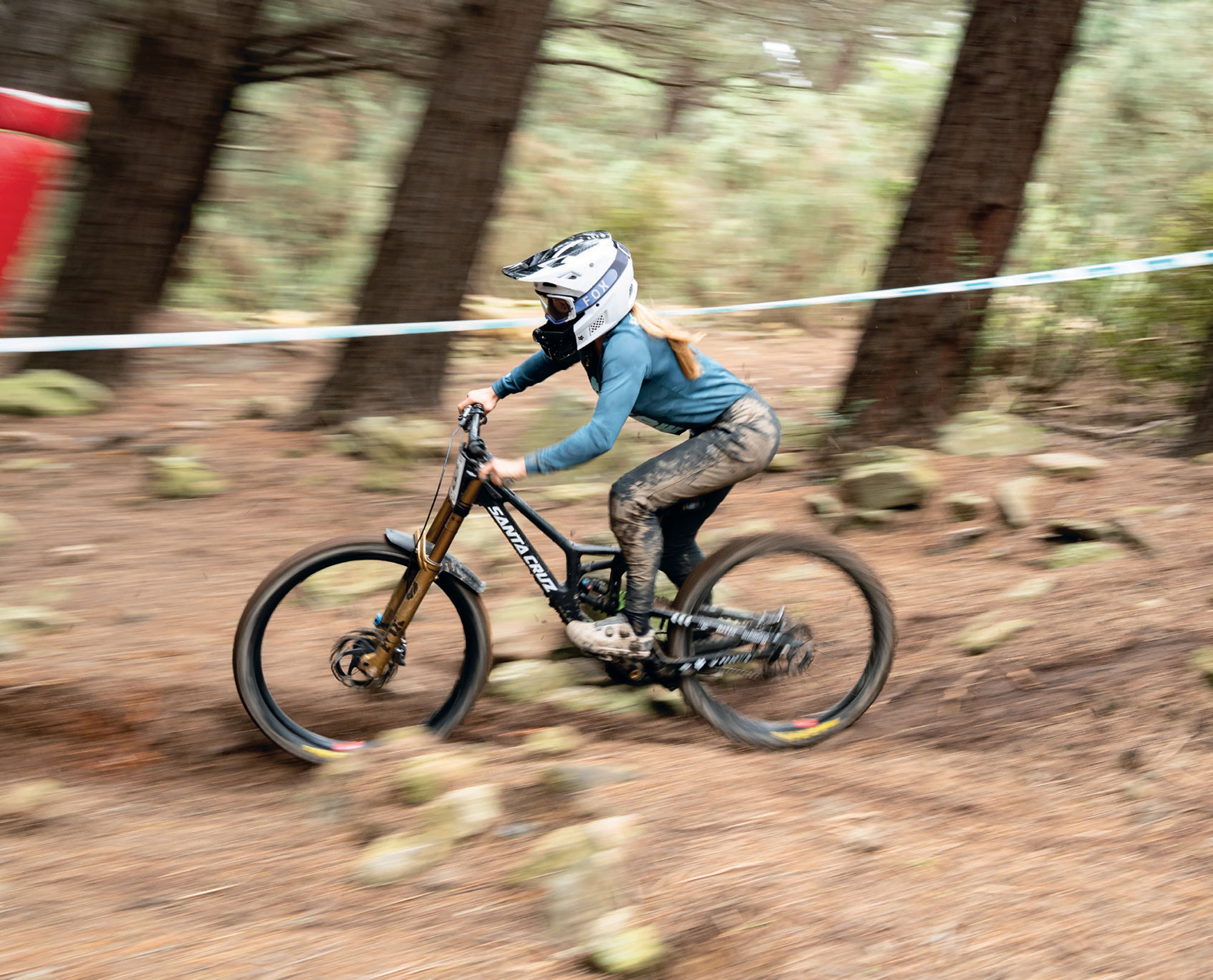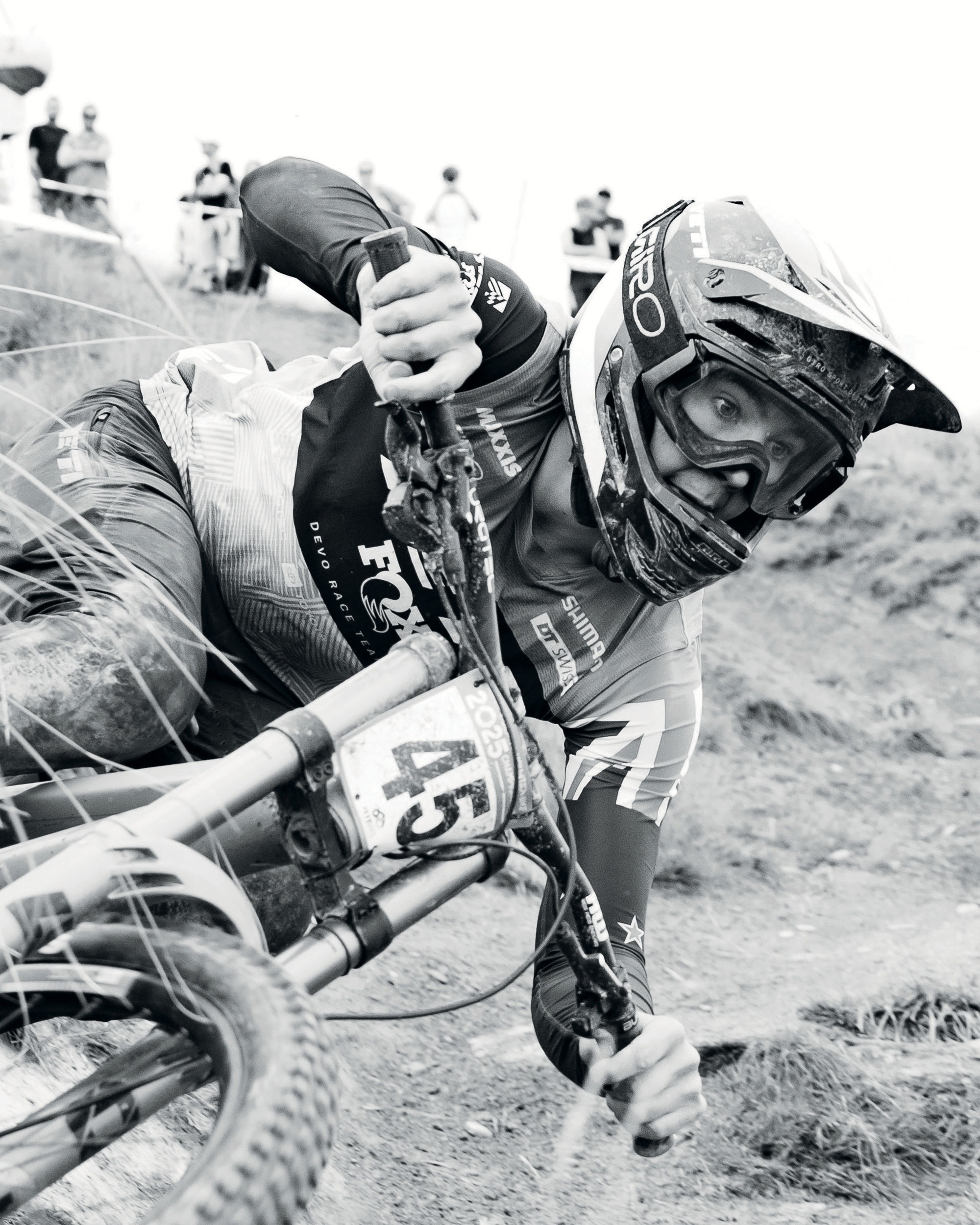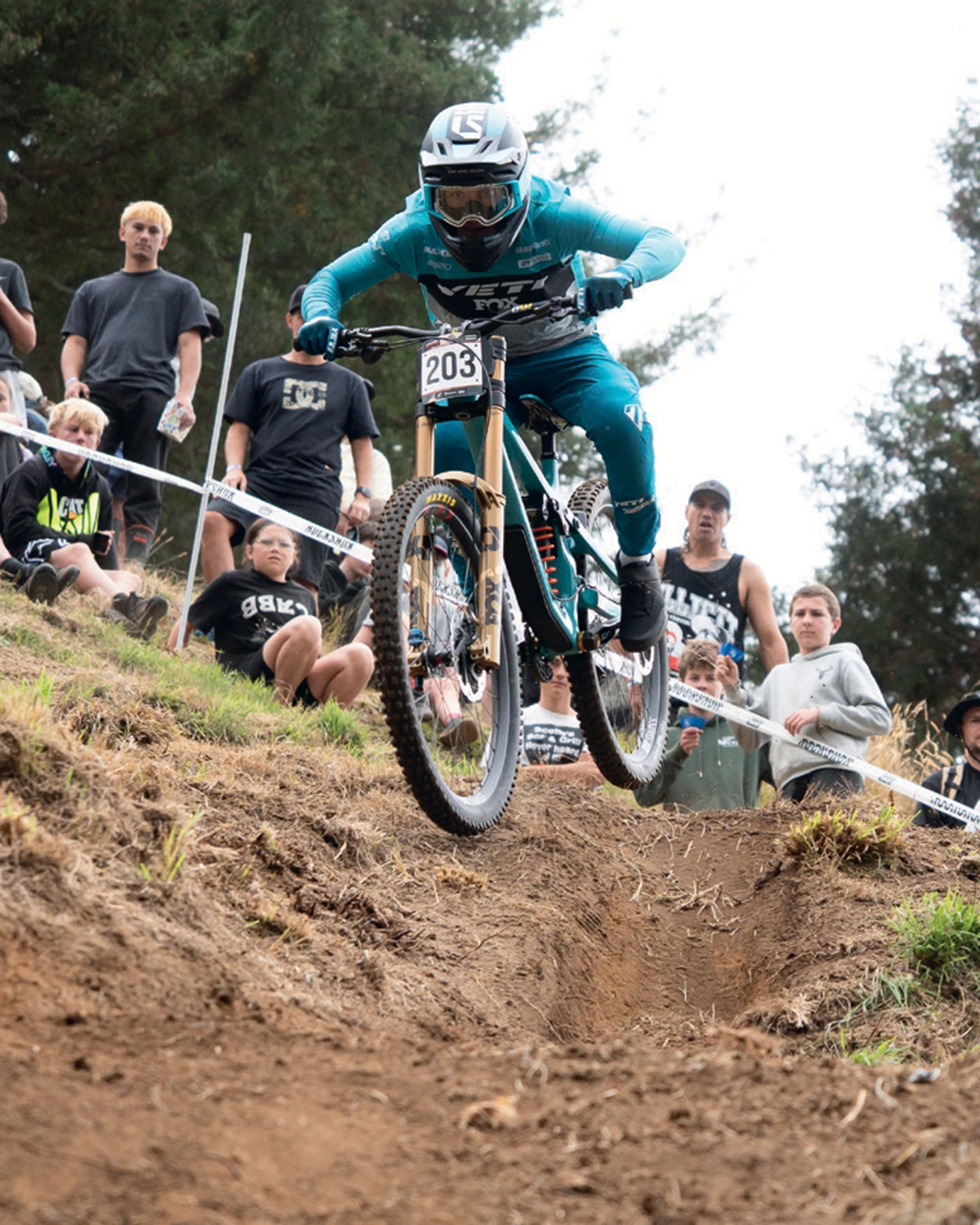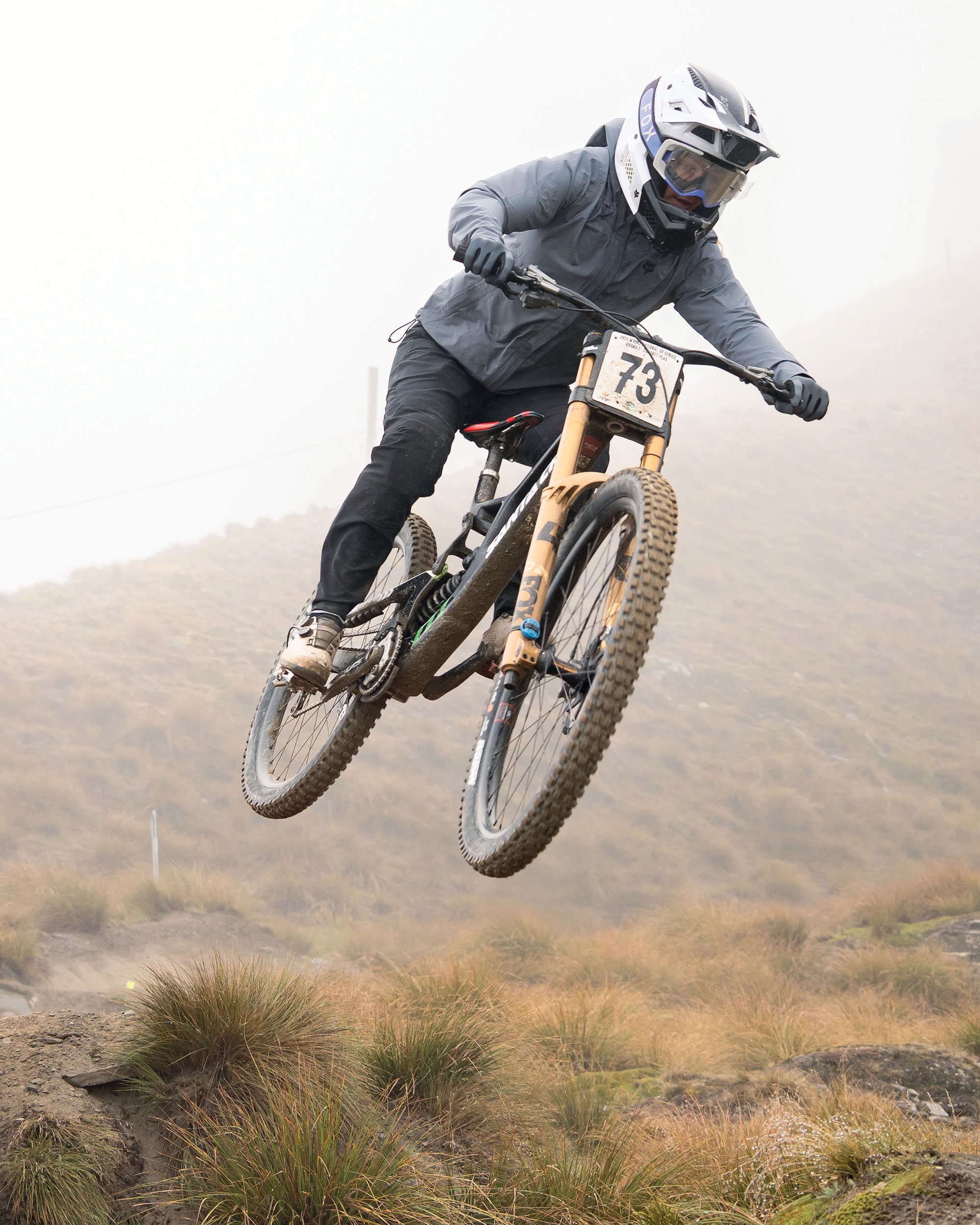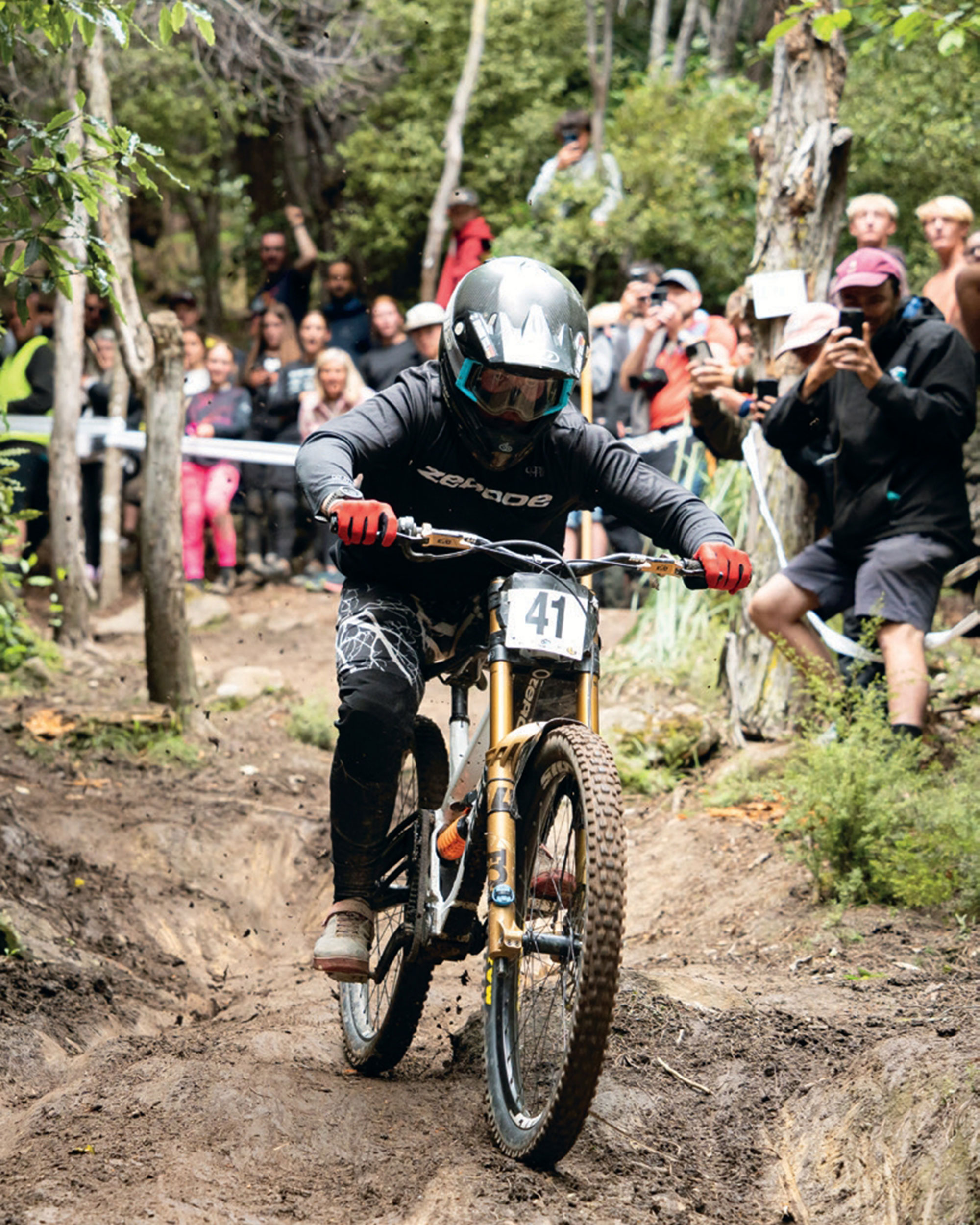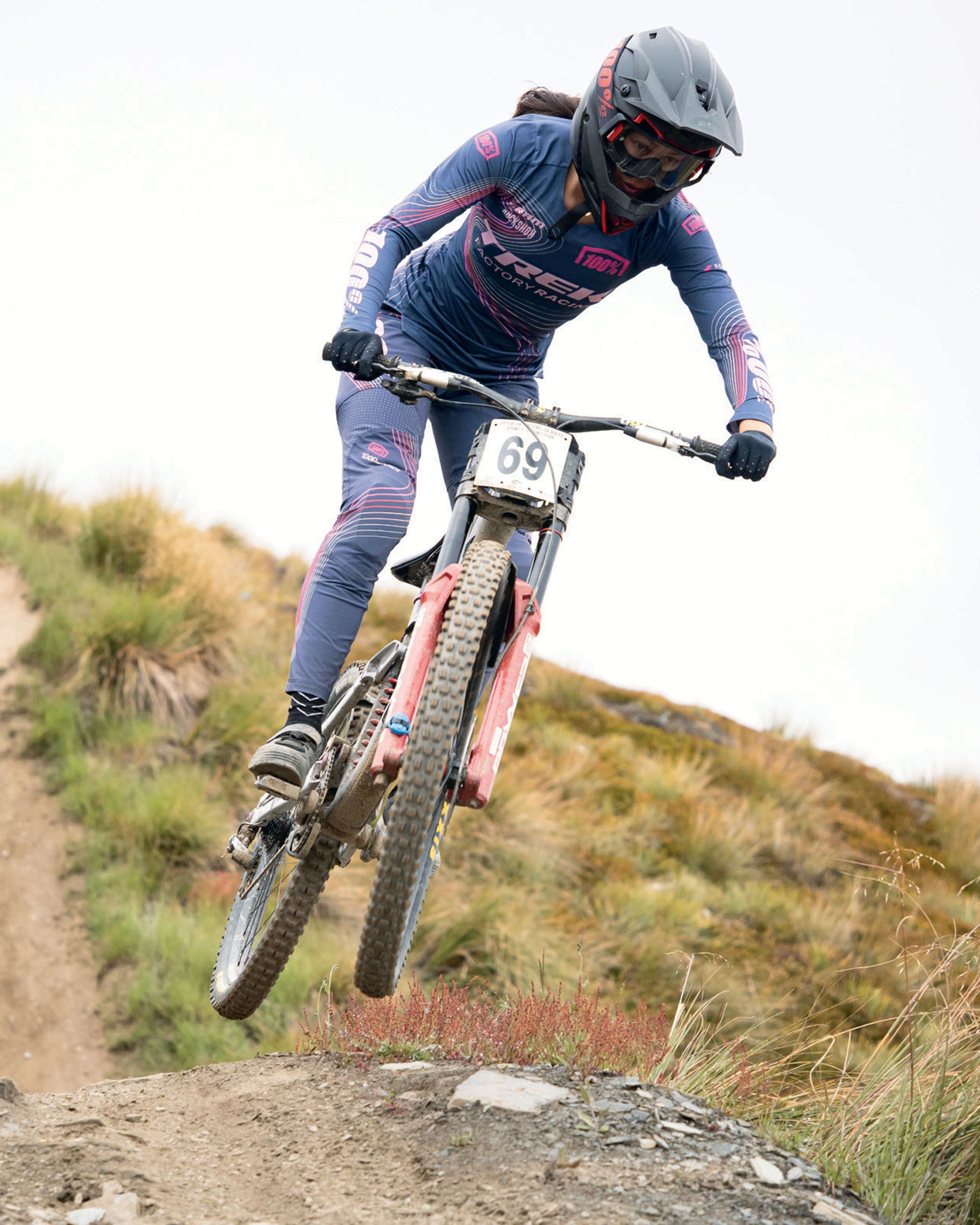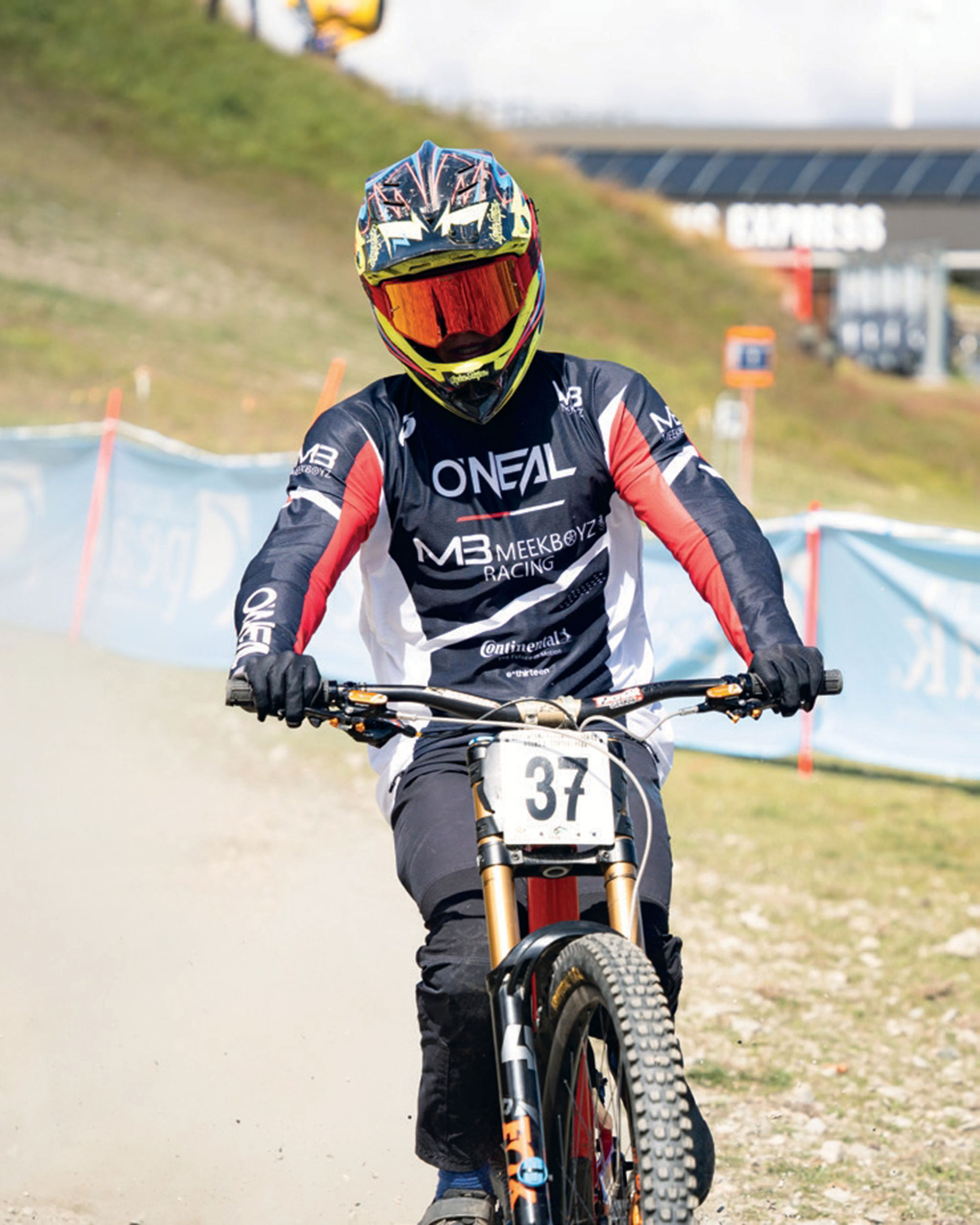Straya: Trails and tales from the Aussie Outback
Words & Images Jamie Nicoll & Anja Foley
Imagine: hot, red desert sand; endless horizons; crimson balls of sunset; hot springs; bike-length lizards; crocodiles and sea turtles cruising around the turquoise Timor Sea; flocks of green budgies; waterfalls crashing over bright orange cliffs; ancient Indigenous culture; camping under the stars–and stillness. “Castel like” serenity! This is Outback Australia. This is where our bikes have taken us.
Along with Collin the Landcruiser, we (Jamie and Anja) have returned to Australia for a second stint of overlanding adventure with the continued mission of riding in remote and unusual places.
Arriving at our friend’s place in Coffs Harbour, New South Wales, we were so excited to be reunited with Collin and rejoiced in the comforts of our all-in-one adventure vehicle—Collin had been parked at our friend’s place on the East Coast for the past six months. We immediately jumped on our bikes and headed out for a few rides at the local Saw Mill trails—a simple little park with sand-based trails. We enjoyed the nice flow and the fun log rides scattered throughout, but it was soon time to fuel up (a cool 250 litres), fill the water tank, restock our provisions and complete some maintenance before heading off. This year’s mission was to head into the Red Centre, crossing the Madigan Line, the most remote track in the Simpson Desert, before taking a northern course to Arnhem Land via Kakadu National Park just east of Darwin.
A day’s drive from the coast, we stopped at Durrigo National Park; a ride that feels like being transported back in time. We checked out the rainforest trails, sitting at roughly 1000 metres in elevation. Durrigo is known for its remnants of ancient forests that are linked back to Gondwana Land.
The Rosewood trail, a shared track, was a superb ride with its exhilarating fast flow and technical creek crossings. A speedy traversing descent on steep terrain made for high concentration, and staying wary of the numerous vines hanging across the track. We stopped so often, captured by the tall ancient trees with huge buttress roots. We climbed around waterfalls flowing down massive boulders and even jumped into the ice-cold river for a very quick morning dip.
A couple thousand kilometres later, we were at Tibooburra, a very remote outback town on the edge of the Strzelecki Desert. It is best known for its 450-million-year-old granite tors. This was a quick ride, but great to stretch our legs on the long drive. Heading up this loop track set amongst a field of ancient granite boulders, provided a mix of smooth track and very technical rock manoeuvres. It was scorching hot too and our daily cold banana smoothies were calling.
The riding was hugely spread out as we crossed the massive continent. We had already woven our way across the Strzelecki and Stuart Deserts using the abandoned Walkers Crossing to get us near to Birdsville, the edge of the next big nothing. As we wanted to explore more of the outback, we now had the huge Simpson Desert to cross to get to our next riding destination: Alice Springs.
The Madigan Line, our most direct route, also meant a lot of sand and over 1,100 dunes to scramble up. Red sand flew as the low-pressure tyres searched for traction, with low-range gears in full use and the right foot deeply engaged. Bouncing around for hours, and then arriving at camp, there is nothing quite like the stillness, the crimson sunsets and sunrises, and sleeping around campfires under the stars.
Pulling into Alice was a chance to restock and do maintenance after the extremely rugged outback crossing. It is one rough crossing that’s for sure, with uncountable bottom outs on our new and raised suspension and heavy corrugations battering everything for hours on end. Our mountain bike community was right there behind us, and we were able to use addresses to receive parts with others welding up cracked bike racks and providing us with a camp spot and hot showers. One of them, Chris, has been the most excellent man to know. He rang up and offered to show us around a new trail network while we were there.
Some 30km of trail, all built by one man, Mark’s network sits near Owen Springs, southwest of Alice. Many Alice Springs riders haven’t even heard about these trails, let alone ridden them. They’re well suited for eBikes as the additional speed creates a lot of fun on less gravity- orientated sections. Rocketing along on flat sections, and weaving our way through narrow stands of trees, we followed dry river beds up and down rocky outcrops, and long spinifex grass, constantly careful of tyre placements on the many abrasive slab rock sections.
Darwin sits on the coast, 1500km directly north of Alice. East of Darwin is a traditional Aboriginal area called Arnhem Land. On this route north, just outside of Katherine, we pulled into Nitmiluk NP – the bike trails here are built on the escarpments, high above the Katherine Gorge. The tracks weave between boulder fields and over playful slab rock sections, leaving us smiling, with descriptive chatter flowing. To finish, we dived into the sparkling thermal steam in town, leaving us stoked and refreshed. And, if that wasn’t enough, our new friend Andrew, the local MTB club president, turned out to be an ex-crocodile hunter who back in the day would jump on the backs of up to eight-foot-long saltwater crocs and bring them up to a boat for scientific research tagging. He regaled us with stories of his youth, diving—yes, diving not jumping—from 200-foot (61m) towers into the sea at Port Darwin, and even his time on the set of Crocodile Dundee. Being an ex-park ranger with excellent storytelling skills, Andrew is a walking encyclopaedia for all things nature-related. He was so entertaining that his stories distracted us on even the longest climbs.
Arnhem land and the Cobourg Peninsular, as a riding destination, are not mentioned anywhere that we found, so we thought it sounded like a great start. Once again, this meant filling the full 250 litres of diesel to make the distance there and back on these remote roads.
Arnhem Land has been an Aboriginal stronghold for over 65,000 years. British colonizers struggled to create a lasting presence here due to the extreme tropical conditions, leaving the indigenous population and their way of living comparatively undisturbed. Aboriginal elder of the area clan, Violet Smith, quotes; “Long ago we Jawoyn lived here. The old people have passed on. It’s okay for you to go around here. You stay maybe two nights, then you go back to your country”.
Our efforts to get the correct permits would test even the most tenacious administrator. Getting into Arnhem Land from the west means traversing the Kakadu National Park with its stunning rock gorges and deep plunge pools. Even the accepted swimming spots are somewhat “at your own risk” as from time to time a saltwater croc has made its way into these pools undetected, avoiding the purpose-built traps and monitoring. Oh, but these pools are so delightfully refreshing—we were now well into the 40-degree zone with high humidity which makes any type of exercise, including a leisurely bike ride, feel like a workout.
The border to Arnhem Land is via the famous ford at Cahills Crossing on the East Alligator River, most famous for its large saltwater crocs swimming around on either side of the vehicle—as you can imagine, it is not a place to get stuck that’s for sure. We counted 12 crocs in the water around us as we drove across the river, all waiting for the fish to come over the rocks with the tidal shift. From our camp, there was a sweet 40km bike ride around Smith Point, the northern tip of Garig Gunak Barlu National Park on the Cobourg Peninsula. With the vastness of the Timor Sea in the background, Olive Ridley sea turtles coming on shore to lay their eggs, and an epic UNESCO wetland, the ride became a well-rounded experience.
After an epic trip through the most remote parts of Australia, Jamie and Anja are planning on shipping Collin over to South Korea, to access Russia, Mongolia, and many of the Stans, en route to Europe. Stay tuned for more adventures.
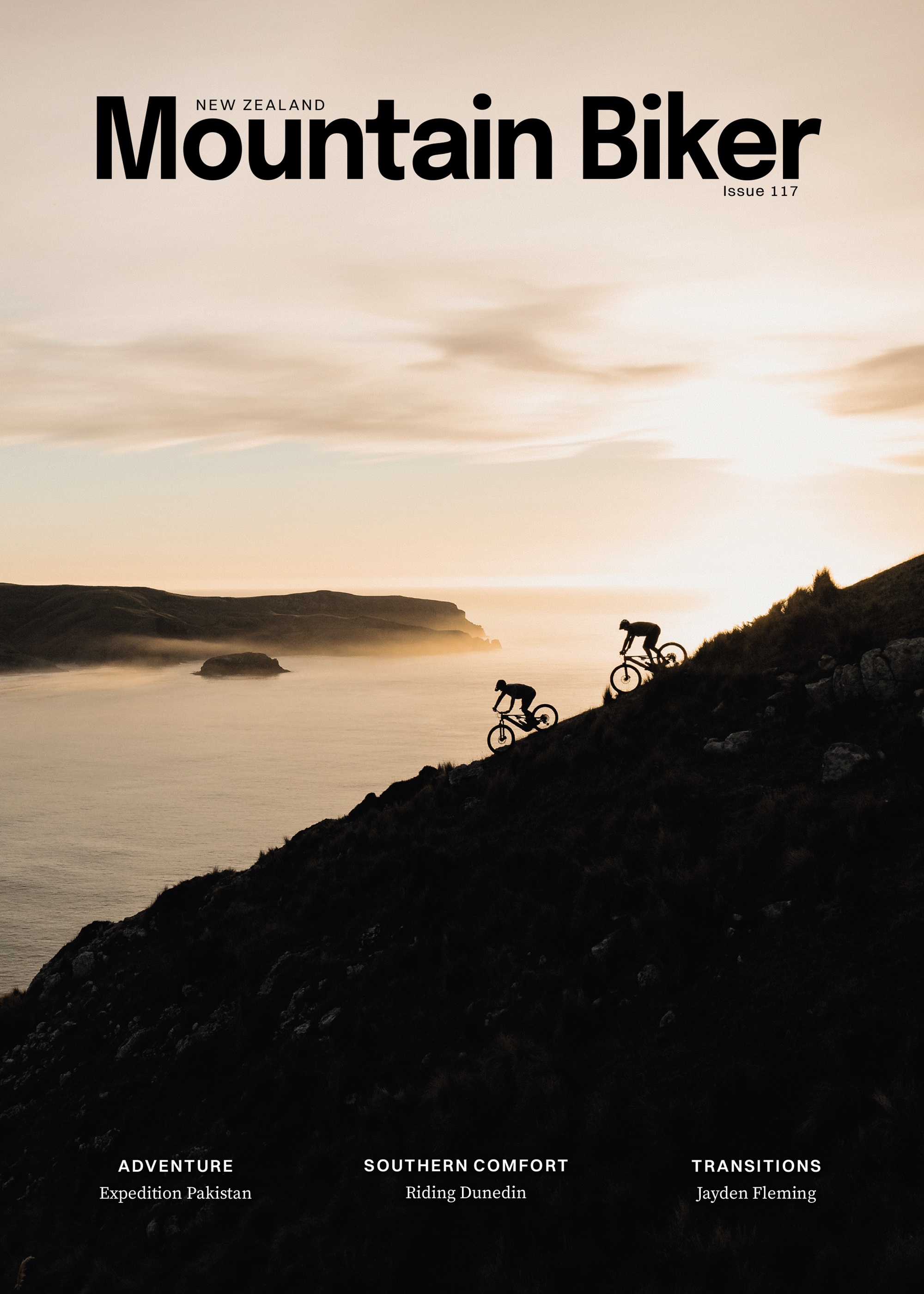
Leaders of the New School
Words & Images Riley McLay
New Zealand has recently experienced a golden age of downhill racers, putting our small country on the map as a powerhouse of talent. Originally, it was riders like Brook Macdonald, Sam Blenkinsop and Wyn Masters who stood out for their raw speed mixed with a relaxed outlook on racing, creating an international reputation that showcased the spirit of New Zealand’s mountain biking culture.
The torch was then passed to the VANZACS, where the talent pool increased with the likes of Eddie Masters, George Brannigan and Matt Walker redefining what was required to find racing success. This was the era of incorporating the DIY mentality of getting the job done by any means necessary with a lifestyle-based approach to building their careers. While both cohorts of talent found success at the World Cup level, New Zealand has since experienced a noticeable gap in racers transitioning from juniors to elite success. Now, however, New Zealand is home to an influx of junior talent already making waves globally.
Aotearoa has always had a strong racing scene at the grassroots level, but breaking onto the international stage comes with significant challenges. Kiwi racers have consistently faced two major barriers to competing internationally. One being the fact that, as you can imagine, chasing the World Cup circuit isn’t cheap; and two, our geographical isolation, making travel something of an ordeal. With the sport largely based in Europe, traveling back and forth from New Zealand isn’t practical for most people. Instead, riders must base themselves there for most of the season, which can be three to four months. The financial burden is high even before racing begins, not to mention when you factor in race fees, insurance, spare parts and essential nutrition. The mental strain of just getting to races isn’t ideal when a racer is chasing good results. This is why external funding and sponsorships are so crucial for success.
As the sport becomes more professional, privateers are increasingly being pushed out of competition. This makes securing a spot on a factory team more important than ever. Recent UCI rule changes have made it even harder for privateers to qualify for a World Cup, so riders must now earn UCI points through a new feeder series called the Continental Cup. Finishing in the top five of any Continental Cup Series grants access to the next World Cup on the calendar. Alternatively, winning their country’s National or Continental Championship guarantees automatic entry for the season. Confusing, I know. And yet another hurdle for Kiwi riders, making strategic race planning more critical than ever.
New Zealand riders have been fortunate to hone their skills on some of the world’s best downhill tracks, contributing to the development of top-tier talent. Over the years, as mountain biking’s popularity has grown, there’s been a collective effort to expand and improve existing networks to meet increasing demand. As a result, New Zealand has become a go-to destination for the world’s best riders to train during the Northern Leaders of the New School Hemisphere off-season. We’ve all seen clips of the likes of Ronan Dunne and Jackson Goldstone going full throttle down the Coronet DH track. With social media being so accessible, having the world’s best riders on our shores not only provides incredible exposure for mountain biking in New Zealand, but it also inspires a new generation to take up the sport. As more kids get into biking, many want to try racing and push their own limits—so much so that the Secondary School Nationals have been sold out year after year.
Honing talent at an early age is the best way to develop habits for success, but balancing race results with the need to play into the social media game to get noticed, can be tricky. Marketing yourself as a junior rider has always been challenging, but the landscape has shifted with new changes to the UCI World Cup format. Now, junior riders not only have their runs televised on race-day broadcasts, but their UCI points are also valued equally to those of elite racers. As a result, teams see greater value in including junior riders—not just for long-term development, but also for securing enough points to qualify their team for the season.
Talent seems to come through in waves, and a new generation of Kiwi downhill racers is already making its mark on the world stage. It all kicked off with Jenna Hastings bursting into the spotlight, winning the Junior World Championships in Les Gets in 2022. Then, in 2023, New Zealand stole the show once again with a clean sweep of the podium at World Champs, thanks to Erice van Leuven, Poppy Lane, and Sacha Earnest. Erice went on to become a back-to-back Junior World Champion and overall series champion in 2024, securing a sought-after contract with one of the biggest teams on the circuit, Norco Race Division. Sacha’s impressive efforts didn’t go unnoticed either—she was picked up by Trek Factory Racing. Young phenom, Eliana Hulsebosch, impressed by securing a deal with the Santa Cruz Syndicate after a breakout season in 2024 on The Union. Eliana consistently finished in the top five and clinched her first World Cup win in Val di Sole, Italy.
In the junior male category, several Kiwi riders have been making a strong impact on the World Cup stage, with Oli Clark and Rory Meek standing out with a number of impressive top 20 finishes in 2024. After missing over half the season due to injury, Tyler Waite made a strong comeback, finishing fourth at the World Championships, second at Loudenvielle, and third at Mont-Sainte-Anne to round out the season. Being part of a powerhouse team like Yeti Factory Racing, with the experience of riders like Richie Rude and Camille Balanche to learn from, he will undoubtedly have plenty of eyes on him in 2025. Finally, Luke Wayman was the epitome of consistency last season, securing second place in the UCI World Cup junior overall and never finishing outside the top 10 in any race. In 2025, Luke will be riding for Continental Atherton Racing—a team led by a legend of the sport, Gee Atherton. Also, becoming teammates with 2023 World Champion, Charlie Hatton, will provide the perfect environment to build into his first year in the elite ranks.
Development race teams are not a new concept, but Envision Racing aims to expand its rider’s opportunities—not just in racing, but by helping them build connections for careers beyond the track. Founded by Cam Cole and Liam Jackson, the team provides industry support to help riders compete while also teaching them the expectations of becoming professionals in the sport. Cam’s experience and connections as a former World Cup racer, and Liam’s marketing expertise, helps mentor riders to understand their value to sponsors while still being appreciative of the opportunities given. While raw speed gets you on a team’s radar, Envision Racing values a combination of attitude and work ethic above all else. Envision Racing’s goal is to minimize upfront costs for their riders by supplying them with a bike and gear for the season. Riders can then sell their previous setups to fund travel and chase races. The 2025 race season has already delivered strong results for the team. Rider Cole Hulsebosch claimed victory in the Under 17 category at the National Championships in Rotorua, a perfect way to kick off the year as he prepares for his Northern Hemisphere season. Meanwhile, Jonty Williamson’s standout performances have earned him a contract with Yeti Factory Racing for 2025. This marks a major success for the Envision Racing team, whose mission is to serve as a steppingstone for opportunities like this. Inspired by top development programs overseas, Envision Racing remains committed to identifying and nurturing young talent, helping them reach their full potential.
The NZ MTB Academy offers a fresh alternative to the traditional development team model, bridging gaps in an athlete’s progression to help them succeed on the international stage. Founded by Sam Thompson, the academy draws on his extensive experience running mountain bike programs and coaching in the gravity space, equipping Kiwi riders with the knowledge and support needed to navigate the World Cup racing scene more effectively. What sets the academy apart is its flexibility. It works with riders, whether they are on a team or not, fostering lasting relationships for the future. It also provides opportunities for senior riders, such as Tuhoto-Ariki Pene, to take on mentoring roles, passing down firsthand knowledge that they have learnt to the next generation. Being competitive in New Zealand is one thing, but succeeding internationally requires a deep understanding of training, nutrition, and sports psychology to gain an edge. The academy primarily targets junior riders who demonstrate the right attitude, a genuine willingness to learn, and a passion for racing—not just the lifestyle that comes with it.
This past October, the Academy hosted one of its largest camps yet, with around 40 kids in Rotorua. Their future goal is to support as many riders as possible as they progress in the sport, not only during the off-season but also by providing logistical support on the ground while they compete overseas. This structure will ensure that future waves of young Kiwi riders can continue to make their mark on the world stage, and carry forward the legacy of those who came before them—proving that New Zealand will remain a force to be reckoned with for years to come.
